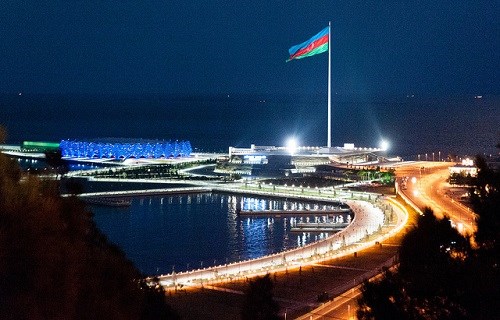Coalition urges the IOC to include labour and human rights

Azerbaidjan is one of the sports event host countries that have been critizied for not living up to human rights standards, says the Sport and Rights Alliance. Photo: Chlara Neve/Flickr
25.02.2015
By Play the GameFirst published on 25 February 2015, updated on 13 March 2015 with comment from IOC president Thomas Bach.
The Olympic Games are at risk of becoming a byword for oppression, says Sport and Rights Alliance (SRA), who in a letter calls on the IOC to use the Agenda 2020 as an opportunity to make human rights, labour standards and anti-corruption measures central in all stages of the Olympic Games.
The SRA is a coalition of sports groups, NGOs and trades unions and includes Amnesty International, FIFPro, Transparency International Germany, Human Rights Watch, Terre des Hommes, Football Supporters Europe and Supporters Direct Europe.
“Too often major sports events have seen people forcibly evicted from their homes to make way for infrastructure, workers exploited, campaigners locked up, the environment damaged beyond repair and notoriously opaque bidding processes.
“The recommendations in the IOC’s Agenda 2020 are a chance to change that and ensure human rights, the environment and anti-corruption measures are central to all stages of the Olympic Games – from bidding, through to the development and delivery phase to final reporting,” says the SRA letter according to a press release from Amnesty International.
The SRA points to four criteria to be included in bidding and host city contracts, starting with the 2024 Games:
- freedom of association
- the right to collective bargaining
- protection from discrimination in employment
- elimination of forced labour and child labour
According to the Amnesty International press release, these standards, if implemented, should be non-negotiable and binding, and the SRA suggests an independent monitoring unit to overlook that promises made in the bid phase are adhered to.
The letter was sent shortly before the IOC’s Executive Board met in Rio, Brazil, where the strategy of the implementation of the Olympic Agenda 2020 was up for discussion.
Asked for a comment on the letter after speaking at the Danish NOC congress last week, IOC President Thomas Bach said that many of the issues raised in the letter have already been addressed through the Agenda 2020 and that the IOC is in a dialogue with many of the signatories about this.
He also informed that he had not yet formally answered the SRA’s letter and would do so before commenting further on the issue in public. However, more generally he said that the IOC cannot change the laws of the chosen host country.
“The IOC will do everything to live up to its responsibility, which is to ensure the application of the Olympic charter at the Olympic Games for all the participants. On the other hand, the IOC is not a world government which can change a political system or the laws of a sovereign country,” Bach said, which was also a conclusion in his speech at the congress.
More information
Press release from Amnesty International:
Read the letter from the Sport and Rights Alliance to Thomas Bach





